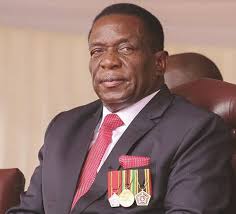ED convinced upper middle income economy still possible

President Mnangagwa is convinced the vision of an upper middle income economy was still possible by 2030, and noted that new mining investments in Hwange area will transform the lives of local communities.
Speaking during a tour of coal mining companies in Hwange yesterday, he said developmental challenges facing Matabeleland North and other parts of the country, could easily be solved if private sector players and local communities played ball by partnering the Government in championing development projects.
President Mnangagwa, who toured Western Coal and Energy Company, the new South Mining Coke Plant, Jinan-Tutu Coke Project and Hwange Colliery Company’s Chaba Mine, said the Second Republic’s drive was to bring about inclusive growth anchored on empowerment of local communities.
Traditional leaders were part of the proceedings.
Hwange district alone has seen expansion of mining investments in the last few years with growing focus on diversification towards adding to the value of mined coal and generating energy, which are set to enhance export prospects and job opportunities.
Creating a competitive business environment, expanding the job market and increasing domestic incomes and exports are the hallmark of his administration, said President Mnangagwa.
Such a path would no doubt yield the desired economic self-sufficiency that is informed by optimum use of natural resources available in the country. As such, he said yesteryear burdens that have seen places like Hwange and other parts of the country lag behind in terms of development, must be ruthlessly overcome.
He commended Mines and Mining Development Minister Winston Chitando and his team for boldly pitching a US$12 billion mining target by 2023, as a build-up towards Vision 2030, saying the drive must be fully supported by similar enthusiasm by other sectors.
“Our desire is to achieve higher middle income status by 2030. No doubt we will achieve the vision we have set but this won’t be achieved by mining alone but all sectors.
“I am happy that in the exploitation of resources in this area, the companies here are doing their best to recruit young people in this area to be given jobs and acquire artisanal skills that are critically important,” said President Mnangagwa.
“We must see the change of lives of the local communities because the resource is here. Yes of course, the country will benefit but we must see also that this area changes and responds to the growth and modernisation of this area.
“What is left is for the minister and your people and the companies to deliver what they are telling us.”
While the Government remains committed to supporting every developmental effort, the President said private sector support was critical in unlocking wider economic opportunities in the districts and provinces where companies operate.
“We need those in Government and the private sector and communities around to all pull in one direction, in unison,” said President Mnangagwa.
“National challenges are not for Government alone but all of us working towards betterment of lives of our people. Hwange is somewhat behind in terms of infrastructure development. We need no area to be behind.”
He called on coal mining companies to address challenges of water, social amenities like schools and clinics, and road infrastructure as part of their corporate social responsibility.
The President said the growing coal mining investments should also assist the country in tackling persistent energy generation shortages, which continue to negatively impact on productive sector.
Zimbabwe is importing electricity due to a deficit in the local generation of power and yet the country has resources to generate that power. Reliance on imports also drains the economy of scarce forex earnings.
On this concern, President Mnangagwa said a roadmap has been set to increase domestic capacity with a view to generating surplus in the short to medium term while also harnessing opportunity around fuel supply and local gas production.
Invictus Energy is already exploring prospects for oil in Muzarabani while efforts to tap into vast coal gas reserves, mainly methane, in Lupane are also underway.
“We need to access modern technology to convert that gas to our use as well as through the coal processing levels and gas in the country. By 2030 we should be self-sufficient when it comes to fuel. Competencies and skills of doing that are there in the market and we should attract them,” said President Mnangagwa.
Despite successive drought seasons that have affected the country due to climate change, President Mnangagwa was concerned that Zimbabwe was importing food, stressing the need for adoption of technology and irrigation driven options to use in combination the vast tracts of arable land and water bodies to enhance farm production.
“We need to produce our own food and feed ourselves. A programme relating to achieving food security is now on course and we have put up a package to support that vision and we believe that within two to three seasons, we should achieve food sufficiency or food security in Zimbabwe. We do not need to import any food at all in Zimbabwe,” he said.
“If we become sufficient in food security in the country, we have adequate electricity and enough fuel in the country, I see no constraints in us achieving what we have set for ourselves, the attainment of higher middle income status by 2030.
“All that is needed is focus, stability, harmony and unity in the country and peace. With that we will achieve our goal. We will change the lives of our people. Now can we walk the talk. That is the message through out.”
In his welcome remarks Matabeleland North Minister for Provincial Affairs and Devolution Richard Moyo expressed appreciation to President Mnangagwa for steering new development projects in the area while making sure that long outstanding ones are completed.
He urged investors to consider employing local people while considering environmental issues in their operations.
President Mnangagwa and his ministerial delegation comprising Ministers Moyo; Chitando; Industry and Commerce Minister Dr Sekai Nzenza; and Environment, Climate, Tourism and Hospitality Industry Minister Nqobizitha Mangaliso Ndlovu continue with the company tours today.
The Herald


